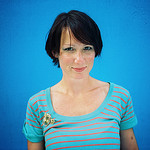This article is more than 1 year old
Radio 4 and Dr K on programming languages: Full of Java Kool-Aid
Hit and miss? Or on the money? Speak your brains
Poll Radio 4 has dipped a toe into Lake Geek with a five part series looking at computer languages. Or more accurately the history and reputation of four computer languages: Fortran, Cobol, Basic and Java.
Presented by soi-disant girl geek*  Aleks Krotoski, the series ("Codes that Changed the World") emphasises the importance of women in the history of computing. It features Fortran programmer Barbara Alexander talking about programming in Atlas-Fortran at the Harwell atomic research station, which she describes as “absolutely wonderful after programming machine code” and Elise Huard extolling the joys of Haskell - which Krotoski describes as “one of the most popular functional languages”. (XKCD begs to differ.)
Aleks Krotoski, the series ("Codes that Changed the World") emphasises the importance of women in the history of computing. It features Fortran programmer Barbara Alexander talking about programming in Atlas-Fortran at the Harwell atomic research station, which she describes as “absolutely wonderful after programming machine code” and Elise Huard extolling the joys of Haskell - which Krotoski describes as “one of the most popular functional languages”. (XKCD begs to differ.)
And of course the programme includes Cobol’s mother, Admiral Grace Hopper. But the programme is very negative about that language, almost as if it’s a bit too easy after the mathematical basis of Fortran. It tells how Hopper was a compete misfit for the US Navy but a natural at the Navy’s computing project at Harvard. It’s a bit of a shame that Hopper is remembered here for the disliked Cobol and not the invention of the compiler.
Moving on, many Reg readers will have cut their programming teeth on Basic. The third edition of the series paints Basic as being the punk-rock of languages, complete with the “your mother wouldn’t like it” overtones. Eben Upton, speaking to Krotoski, naturally expresses the hope that his Raspberry Pi might build a generation of programmers the way Basic did: but nonetheless Basic gets a rough ride in the programme, in particular the evil of GOTO statements - citing Dijkstra “Goto statement considred harmful”.
Then, strangely, Java gets welcomed as being a wonderful language. Krotoski completely swallows the “write once, run anywhere” marketing, rather than the run one, ruin everywhere that is the day to day experience of Java. Java is hailed as being something which has rolled six sixes, getting lucky every time it’s been outdated: not as “what we used to use before HTML 5”.
There is lots of talk of mathematical languages but no name-check for APL, and the last episode feels more like an introduction to the series than an ending. Perhaps a nod to Forth would have been in order - or perhaps not. Indeed radio telescopes get mentioned without Forth’s obligatory inclusion.
But perhaps the greatest omission is C. There is comment that C is believed to be hard to work with which makes it unreliable, but if done right – the Curiosity Mars Rover being cited – it can be extremely functional.
When so much of our world is written in C - it’s behind code in every mobile phone in the world regardless of them being smart phones or traditional phones - it would have been a much more obvious candidate than Java for singling out.
The whole series dances between addressing the Radio 4 audience, which can name every character in A Merchant of Venice but who’ve never heard of Ada Lovelace or Gordon Moore, and wanting not to over-simplify what the geeky talking heads say in the interviews. It does this mostly successfully. There are no pauses to explain “USB” or “server”, for instance.
One thing which doesn’t work is that the series is based around a language timeline on display at the National Museum of Computing software gallery - but this map of languages isn’t on either the programme’s website or that of the museum.
All that said, Radio 4 is to be gently applauded for running a series which deep down is intently techie. There is no comment space on the programme pages so why not give it listen and let us know what you think below. All the episodes are on iplayer and you can listen to them here.
Readers outside of the UK, who have not paid for a British television licence may find that they cannot access it. But then Reg readers generally understand that stuff. ®
Bootnote
*For those unfamiliar with Dr Krotoski, here's a brief biography: First degree in psychology. Commenced work as a TV presenter aged 25 on Channel 4 videogaming show BITS in 1999 alongside two other attractive young women. Since then worked as journalist and broadcaster for the Guardian and BBC among others. Placed #8 on CNET listicle of girl geeks in 2006, just ahead of Paris Hilton and below Lisa Simpson and Daryl Hannah. Completed a PhD on Sadville in 2009. Married to the notorious Ben Hammersley, with whom she has a daughter born last year. (She describes her daughter as "a new, top secret, personal long-term project that I expect will distract me for a lifetime".)
Krotoski alludes during the programme to Basic coding on ZX Spectrums and/or BBC Micros as a young person. This is the only immediately visible evidence of her programming expertise.
